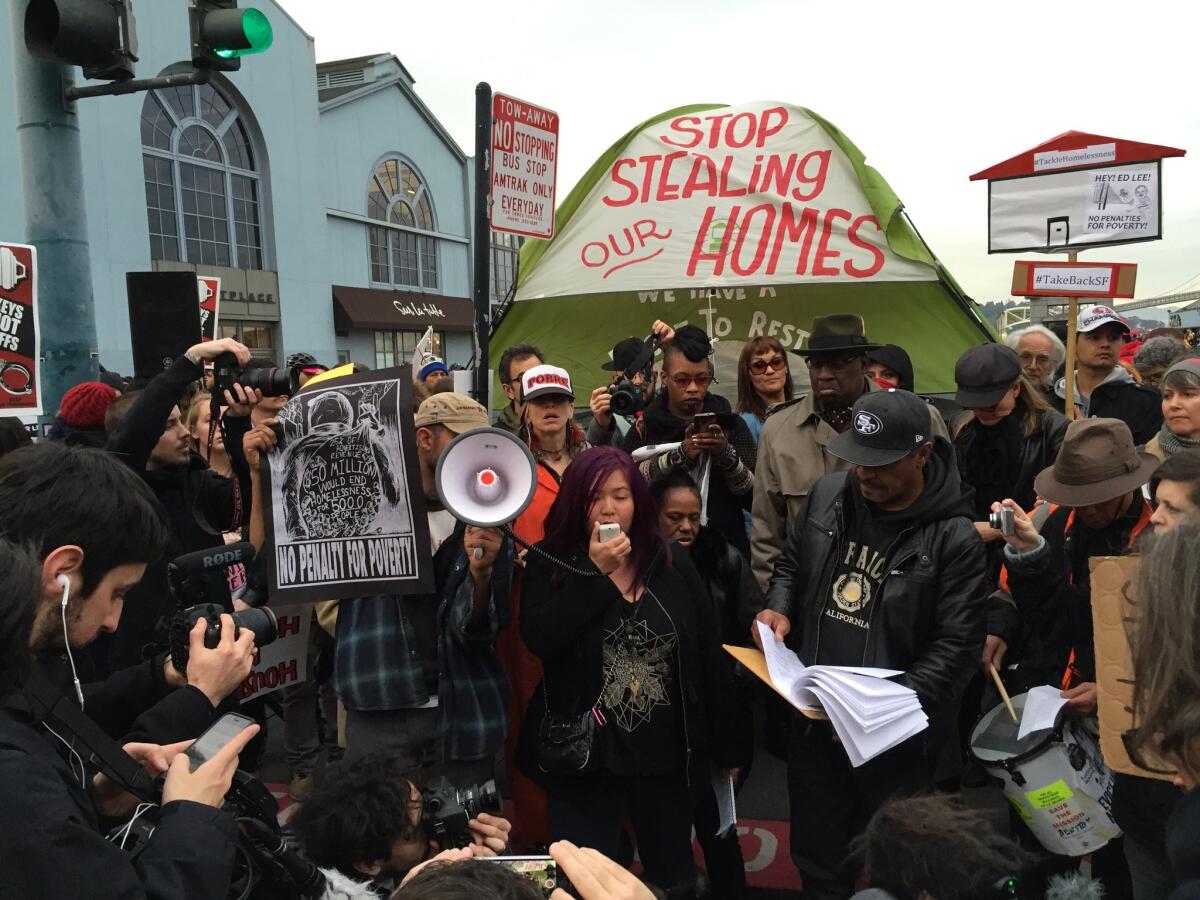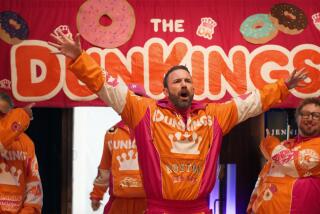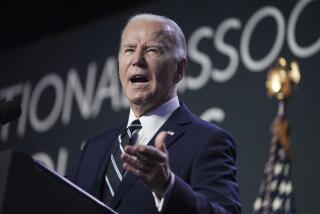California Journal: Party down in San Francisco for Super Bowl! (Homeless people, go away.)

Julianna Cheng, 29, center, speaks at a rally at San Francisco’s Embarcadero protesting the removal of homeless people to make way for Super Bowl 50 revelers.
The demonstration took place on the Embarcadero, just across the street from a fenced-off party venue called Super Bowl City. In normal times, Super Bowl City is a premier public space, along the city’s popular waterfront, with a windswept plaza and a children’s playground, and two blocks of Market Street.
Super Bowl City is meant, I guess, to be a gift to the people of San Francisco. Once they get past the metal detectors, it’s hard not to feel as if this is a corporate branding opportunity as much as anything else. (Did I forget to mention the actual name is Super Bowl City Presented by Verizon?). If you can tune out the corporate logos, you might enjoy listening to live music (Chris Isaak and Alicia Keys). Or perhaps meeting some players, cheering along in pep rallies, listening to “sports and technology chalk talks,” and watching fireworks.
And it’s all free!
Well, it’s free if you don’t count the estimated $5 million local taxpayers belatedly discovered they are shelling out for police, fire, emergency and transit services. As my colleague Michael Hiltzik recently reported, Santa Clara, where the Super Bowl is actually taking place, was smart enough to get the obscenely profitable NFL to reimburse it for its costs. San Francisco made no such deal.
No big surprise, then, that not everyone is fired up about the party.
Among the spoilers: a couple of hundred protesters who turned out Tuesday to express their displeasure outside the gates of Super Bowl City. Many have been irritated about the Super Bowl for months, ever since Mayor Ed Lee announced that homeless people sleeping in the Super Bowl City area would have to move along.
Indeed, dozens of homeless people were rousted to make way for Super Bowl City. In other parts of the city, police have been clearing out homeless encampments with little notice. This doesn’t sound like a crime against humanity — what else is new, right? — but with eyes on San Francisco as headquarters of the country’s biggest sporting event, and buildings draped with Super Bowl logos, the struggle over dignity for homeless people has become a symbol of a more difficult question: Who owns the place these days?
“They say that San Francisco is a city that has heart,” said Tom Ammiano, a former Democratic assemblyman and San Francisco supervisor, the only high-profile politician in the crowd. “I am feeling that it’s missing lately. And I am feeling an even bigger absence: Where is our soul?”
Protesters toted signs both pithy (“People Before Profit”) and wordy (“In terms of income inequality, San Francisco fares worse than Rwanda & only slightly better than Guatemala”).
“They treat homeless people in this city worse than other people would treat their dogs,” said Julianna Cheng, a 29-year-old mother of a 3-year-old daughter who was homeless during her pregnancy. “We are a city with incredible wealth and we have one of the largest homeless populations in the nation, and the way we treat our most vulnerable communities, really shows who we are as a city. They tried to get the homeless out of the way, so the city can maintain its reputation while we have tourists and all these visitors for the Super Bowl. That’s disgusting.”
Ammiano bristled at the presence of dozens of police officers in riot gear. “What are we, ISIS?” he said. “How many cops can we have? Who’s paying for that? What am I going to do, hit them with my purse? I’m so threatening, aren’t I?”
He bemoaned the fate of a “homeless bill of rights” he proposed in Sacramento in 2013. It died in committee.
“As a gay man, I have seen hate,” he said. “But I have never seen such hate, and such ignorance, visited upon a population, meaning the homeless. Never, ever have I seen how much they are reviled.”
The passion around the issue of homelessness in San Francisco is stunning for anyone who has spent time around skid row in Los Angeles, a truly disgraceful symbol of our inability to care for our sickest and most desperate. I can’t think of the last time I read about a demonstration against homelessness in Los Angeles as passionate as what I witnessed here this week.
Perhaps it’s because relatively compact San Francisco has been transformed so cataclysmically in the last decade by the forces of high technology, and the disrupting influx of wealth and development, while the sprawl of Los Angeles camouflages so many of its disparities.
The new Gilded Age of Tech has ratcheted up the tension between the haves and have-nots, and forced San Francisco to take a long hard look at the kind of city it wants to be.
“All of this for what?” said Nati Garcia of St. James Infirmary, a Tenderloin clinic for sex workers that has lost its lease. “For Visa? For Verizon? Who is really selling themselves?”
Twitter: @AbcarianLAT
MORE FROM ROBIN ABCARIAN
Barren a year ago, a snowpack station comes up deep and dense
Poetic justice: Felony charge for maker of anti-Planned Parenthood videos
How prostitution is ‘modern-day slavery,’ and what law enforcement is doing to stop it
More to Read
Start your day right
Sign up for Essential California for news, features and recommendations from the L.A. Times and beyond in your inbox six days a week.
You may occasionally receive promotional content from the Los Angeles Times.







